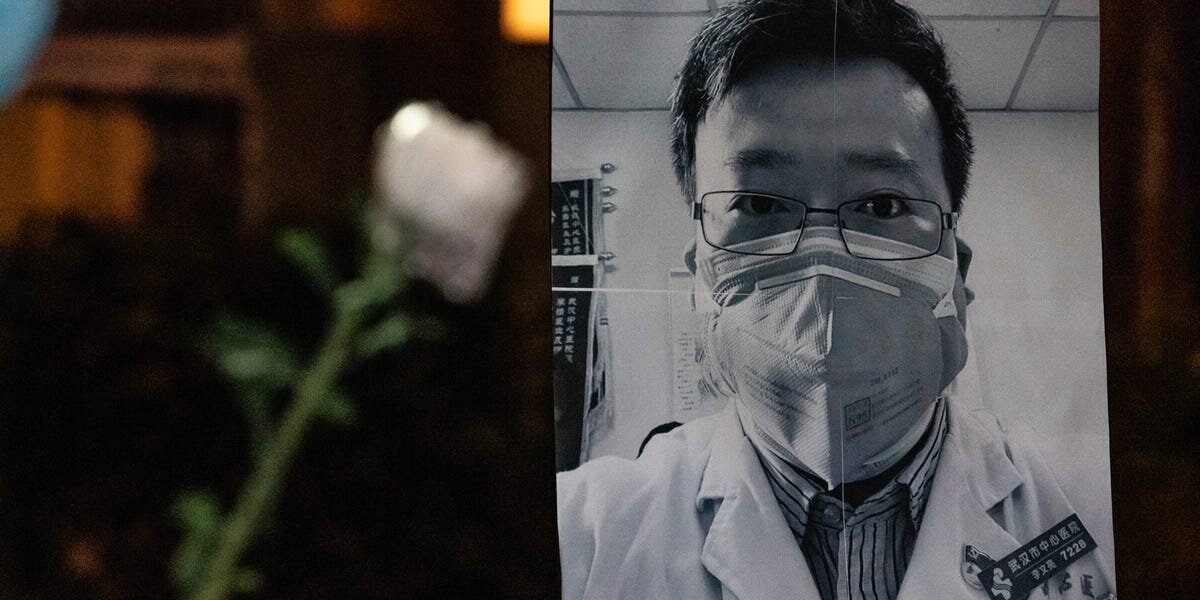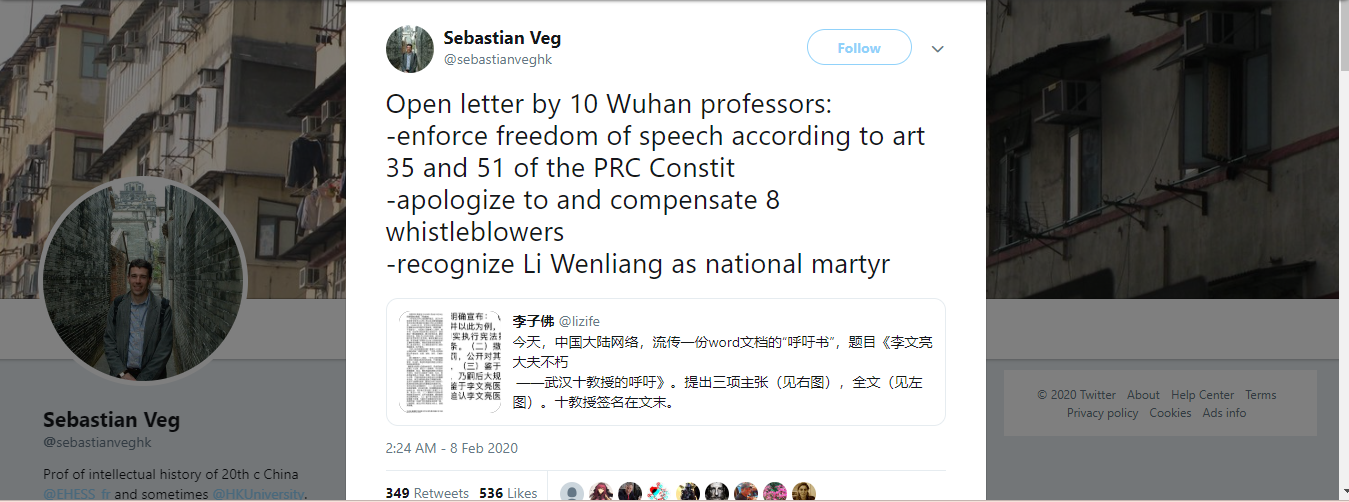10 Wuhan Professors Signed An Open Letter Demanding Free Speech Protections After A Doctor Who Was Punished For Warning Others About Coronavirus Died From It
At the beginning of the Wuhan coronavirus outbreak, local physician Li Wenliang alerted his medical school alumni group via the messaging application WeChat about the discovery of a SARS-like disease.
Author:Andrew StevensonReviewer:Johnathan MillerJan 26, 202396.3K Shares1.8M Views

- The Chinese government should apply its own freedom of language content to the People's Republic of China Constitution, according to an open letter signed by ten academics from Wuhan.
- The letter comes after Li Wenliang, a doctor from Wuhan, left the city after receiving a punishment from the police for "making fake remarks" after informing people about the Wuhan coronavirus, which he later contracted.
- The government is urged in the open letter and another letter written by academics across China to express regret, pay coronavirus whistleblowers, and designate Li as a national martyr.
At the beginning of the Wuhan coronavirus outbreak, local physician Li Wenliang alerted his medical school alumni group via the messaging application WeChat about the discovery of a SARS-like disease.
He was then chastised by Wuhan police and required to sign a paper stating he had made "false statements" against the Chinese internet.
The authenticity of Li's warning was confirmed, and the Wuhan coronavirus has killed at least 720 people and infected over 34,500 around the world. Li, 34, died on February 6 after contracting the virus while handling individuals.
After his departure, professors from around China signed open letters to the Chinese government.
Ten Wuhan academics signed a letter demanding that the government enforce its own freedom of language provisions in the Constitution of the People's Republic of China, as well as apologizing for not compensating eight coronavirus whistleblowers.
Screenshots disseminated on Twitter by the French scholar Sebastian Veg, who studies the intellectual history of 20th-century China, are believed to have been obtained from the Chinese internet.
They reveal the professors' signatures as well as excerpts from the open letter, which cites Articles 35 and 51 of the Chinese Constitution.
Article 35 states that Chinese citizens "enjoy the freedom of speech, of the press, of assembly, of association, of livelihood, and of course expression," while Article 51 states that the exercise of Chinese citizens' rights "must not infringe upon the interests of their nation, of society, and of the collective, or upon the liberty and rights of other citizens."
The open letter reads based on an English translation from the non-profit China Change:
For thirty years the Chinese are forced to surrender their liberty in exchange for security, and they fall prey into a public health catastrophe and therefore are less secure than ever.
A humanitarian catastrophe is upon us. The rate with which the rest of the planet is repelled by China is quicker compared to the spread of this virus, leaving China in unprecedented worldwide isolation.
People Also Ask
How Long Can COVID Stay In Your System?
Those infected with severe COVID-19 may continue to be contagious for up to 20 days after 10 days of isolation.
How COVID Affects The Lungs?
Lungs are the first organ to be impacted. In the early stages of an infection, the new coronavirus rapidly infiltrates cells in our respiratory system, attacking the epithelial cells lining the airways, which normally trap and eliminate allergens and pathogens, and flooding the airways with debris and fluids.
What Happens When You Have COVID?
COVID-19 may be present if you have a fever, muscle pains, cough, or other symptoms. The majority of COVID-19 patients have minimal symptoms and can heal at home.
Conclusion
The open letter requests that the Chinese government recognize Li as a national martyr. A second petition written by nine Chinese academics proposed that February 6 be designated as "National Freedom of Speech Day" in Li's honor.
Jump to

Andrew Stevenson
Author
Meet Andrew Stevenson, a distinguished male writer whose passion and expertise encompass a wide array of topics, including global news, finance, health, celebrity culture, movies, and cryptocurrency. With a wealth of experience and a keen eye for detail, Andrew delivers engaging and informative content that resonates with readers from all walks of life. His insightful analysis of market trends, health breakthroughs, and the latest developments in entertainment captivates audiences, while his exploration of the burgeoning world of cryptocurrency offers invaluable insights into this rapidly evolving field. Andrew's commitment to excellence and his ability to distill complex information into accessible narratives make him a trusted source of knowledge and inspiration in today's dynamic media landscape. Join him on a journey of discovery as he illuminates the intersections of culture, finance, and technology, shaping the conversation one article at a time.

Johnathan Miller
Reviewer
Meet Johnathan Miller, an esteemed writer and analyst renowned for his expertise in global news, finance, health, and cryptocurrency. With a distinguished background in finance and a meticulous approach to research, Johnathan offers incisive insights into market dynamics and economic trends. His articles are characterized by a profound understanding of health-related issues and a clear articulation of the complexities surrounding cryptocurrency. Through his professional lens and commitment to excellence, Johnathan navigates the intricate webs of our interconnected world, delivering compelling analysis and thought-provoking commentary. Join him on a journey of discovery and enlightenment as he continues to shape discourse in these vital spheres.
Latest Articles
Popular Articles
